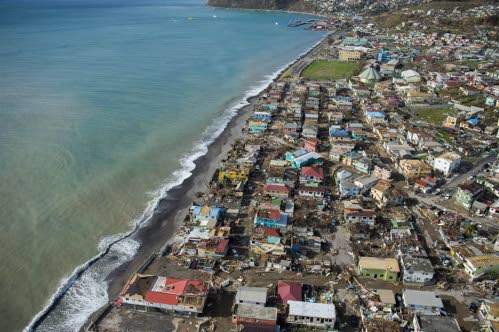An aerial view showing destruction by Hurricane Maria in Roseau, Dominica, recently.
WASHINGTON, DC, USA (CMC) — The International Monetary Fund (IMF) says in addition to permanent damages to public and private capital, natural disasters cause temporary losses of productivity, inefficiencies during the reconstruction process, and damage to a country’s creditworthiness.
In a study that explored the macroeconomic impact of natural disasters, the authors of the IMF Working Paper titled ‘Building Resilience to Natural Disasters: An Application to Small Developing States’ note that small developing states like those in the Caribbean are frequently hit by natural disasters that tend to leave long-lasting scars in the economy.
So far this year, several Caribbean islands — Dominica, Antigua and Barbuda, the British Virgin Islands, the Turks and Caicos Islands, Anguilla and St Martin, have been devastated by hurricanes Irma and Maria.
In addition, several other countries like The Bahamas, Haiti and St Kitts-Nevis have suffered extensive damage as a result of the Category 5 storms.
In the working paper, the authors Ricardo Marto, Chris Papageorgiou, and Vladimir Klyuev argue that in addition to deaths of a non-negligible fraction of the population, natural disasters destroy public and private infrastructure needed for the economy to function, disrupting economic and social activities with long-lasting effects.
“They also put considerable strains on government finances, frequently demanding a swift reconstruction of major infrastructures, with limited room to raise additional revenues or curtail transfers and other expenditures,” said the paper.
The paper assesses two main policy issues — ‘If the government were to fully rebuild the public infrastructure destroyed by the cyclone in less than a decade, what additional resources would the donor community have to pitch in to ensure fiscal and debt sustainability over the medium term?’ and ‘If the government were to invest in resilient infrastructure and save financial resources in a contingency fund, how fiscal and debt sustainability would be improved after the disaster?’




Leave A Comment